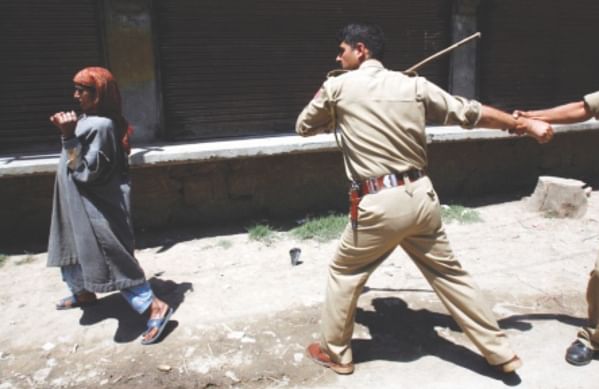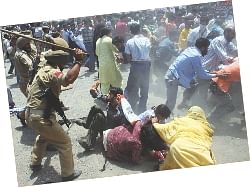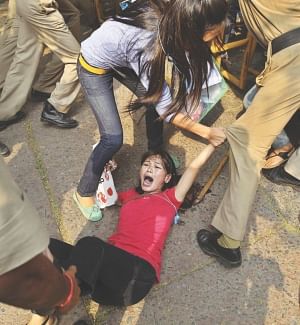| Home - Back Issues - The Team - Contact Us |
 |
| Volume 11 |Issue 38| September 28, 2012 | |
|
|
Food for Thought From Oxymorons to Farah Ghuznavi Some time ago, I found myself laughing out loud while reading an article about how French MPs were considering overturning the ban on women wearing trousers in Paris. I hadn't even known that there was such a ban in place! And it was only now that they were going to discuss removing that prohibition? Talk about being behind the times -apparently, trousers are even considered mandatory attire for modern-day policewomen in the city. Ironically enough, this curious rule was first introduced in late 1799 by the Police Chief of Paris, and it stipulated that any woman wishing to "dress like a man" had to seek special permission from the city's main police station. Given his evident prejudices, one can only wonder what that long-deceased gentleman would make of contemporary policewomen's uniforms.
In 1892, the law was relaxed due to an amendment which permitted the use of trousers as long as the woman wearing them was holding the reins of a horse; in 1909, the lawmakers' generosity went further, extending to women who were either "on a bicycle or holding it by the handlebars"! In 1969, the Paris council asked the city's Police Chief to invalidate the decree, but he refused to do so on the grounds that "unforeseen variations in fashion" might lead to a resurgence of anti-trouser attitudes. Given that the archaic law has survived repeated attempts to repeal it, one must wish this initiative better luck than its predecessors. But if such absurd laws seem laughable at times, the reality of police attitudes pertaining to women and not just with respect to their clothing (though this is an important issue and one that we will be returning to later in the article) is all too often a more serious matter. Saudi Arabia's strict laws against women driving, for example, are enthusiastically enforced by the members of its police force. Perhaps more enthusiastically than actually required, as evidenced by the case of Shaima Jastaniah, who got behind the wheel to protest the law and became a symbol of the country's harsh treatment of women who refuse to conform to its regressive policies. She was sentenced to a punishment of ten lashes for her "transgression". A few weeks later, Princess Ameerah, the wife of the King's influential nephew, tweeted that the King had pardoned Jastaniah. The news was received with enormous relief and assumed to be true. But within three months, Jastaniah's professor from her time studying in the US found out that her former student was to be flogged in spite of the King's pardon. The arbitrariness of the judicial system became all too evident, as the police informed Jastaniah that notwithstanding the pardon, she was scheduled to receive the ten lashes as a punishment for daring to drive.
As her lawyers went into overdrive and her supporters held their breath, good news arrived from an unexpected source. After going to the Jeddah Police Department to be fingerprinted, Jastaniah was informed that her flogging sentence had been dropped. She was told that this was not in any way a response to the petition filed by her lawyers - or the international attention that the case had received - but because the police department had filed a supposedly routine petition for pardon which was accepted. This of course begs the question as to why the police department could not simply have accepted the King's pardon, which one would assume to be non-negotiable. The whole thing sounds suspiciously like a face-saving exercise by the Saudi police, who also took pains to warn Jastaniah that she now had a police record, and would most definitely be flogged if she were to try to drive again. As for the apologists who often make a point of stating that lawbreakers must be punished, they should perhaps remember that no law is immutable. In human history, legislation has been introduced time and again to accommodate changing social attitudes. And that is just as well - otherwise the segregationist laws in the United States that held sway less than 100 years ago, or the apartheid system in South Africa just a couple of decades ago would never have been challenged or changed. After all, in both those systems, unjust and discriminatory laws were brutally reinforced for many years, with severe crackdowns on any dissenting voices. And it is precisely those dissenting voices, which refused to be silenced, that have brought about much-needed changes in legislation. So while the police are undoubtedly tasked with implementing the law, it's worth bearing in mind that the manner in which they do so is often well within their own hands - as we know from the example of our own country. Law enforcement agencies are undoubtedly allowed some degree of latitude in implementation. Often, it is their personal beliefs and attitudes that flavour their actions on the street; and that is critical, because it is often that grey area of "moral perspectives" that will determine whether or not those on the receiving end of police action are treated fairly. In neighbouring India, a commendable initiative undertaken by the media organisation, Tehelka, recently uncovered some disturbing attitudes within the Delhi-NCR police. Not that such barbaric views are in any way limited to the officers serving in Delhi, of course. The recent case in Guwahati, Assam - where a teenage girl was beaten up, molested and stripped by over a dozen men in a busy street outside a bar - while an off-duty journalist filmed the assault (and called a cameraman to help him do that), has rightly created waves across the border and around the world. The problem of police inaction in such cases has been demonstrated beyond the shadow of a doubt. The video went viral, with an outraged public demanding to know why the journalist did not in fact call the police immediately, and why the police dragged their feet on the case for over a week while local citizens uploaded photos of the perpetrators onto social media websites, demanding justice. Finally, five days after the initial incident, the DG of Police defended his officers by saying that they had identified eleven out of twelve molesters and arrested the four accused, but that it had taken time for them to make the arrests because they had to be absolutely sure that they had the right people. The fact that images of the accusers were already available all over the Internet (and therefore identifying the men should not have been a matter of nearly a week), was not something he was able to explain away. The widespread misogyny in the views held by an unacceptably high number of Indian police officers was made evident by the results of the Tehelka sting, in which 30 policemen were interviewed in 23 police stations across the NCR. The detailed testimonies of the police officers were deeply disturbing, and should be required reading for everyone. But as one article analysed, even their responses as to why rapes take place indicate how far the Indian police force - alongside the others in the region - has to go before it can lay any claim to modernity, let alone progressive policing!
To give just a few examples, these men who are entrusted with ensuring the safety of the public, attributed the high number of rape cases in Delhi to factors such as the tired excuse that unless women are covered from head to toe, men somehow can't "resist" raping them. If women "display themselves" by wearing anything other than a shalwar kameez or sari, then according to Sub-Inspector Arjun Singh, SHO of Surajpur Police Station: "She is dressed in a manner that people get attracted to her. In fact, she wants them to do something to her." Is this man serious?! Yes, apparently he is. As are his equally ignorant, misogynistic and medieval-minded colleagues, such as Yogender Singh Tomar, Additional SHO, Sector 39, Noida. Asked if it was easy for a rape victim to approach the police, he replied: "It's never easy for the victim. Everyone is scared of humiliation. Everyone's wary of media and society. In reality, the ones who complain are only those who have turned rape into a business"! By this impeccable logic then, if you have "really" been raped, you will never complain - because of the shame and vilification that we all know will follow. So if you choose to risk that, you have no shame and were clearly not "really" raped, but are in fact in the "business" of rape. His twisted justification is oddly reminiscent of the medieval witch-hunts where women would be (and in some parts of the world, such as Bihar, continue to be) accused of casting the evil eye and "tested" in order to prove their guilt. In one version of this process, a woman would be weighed down with rocks and thrown into deep water. If she managed to stay afloat, it was clear proof that she was a witch; if she sank, she had been wrongfully accused. But of course, either way, death was the inevitable outcome - whether it was death by stoning, burning or drowning. In parts of the world, “police protection" has become an oxymoron. So in the end, it's well worth heeding the advice of the UK police special advisor Dr Samuel Johnston, who spoke of the importance of communities in assisting the police to do a better job. I don't think he had in mind the Guwahati example, where it was public pressure and Internet postings of the video that helped identify the culprits and forced the police into taking action. But I do agree with his assertion that policing is too serious a business to leave to the police alone - especially in countries where regressive and misogynistic views remain widespread. |
||||||||
Copyright
(R) thedailystar.net 2012 |


